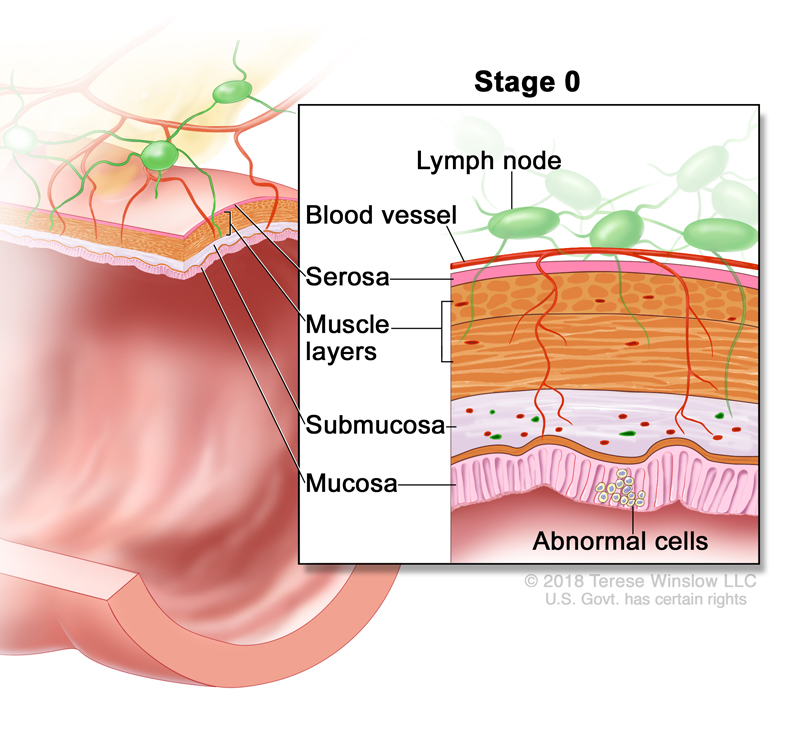Stage 0 Colon Cancer ICD 10 is D01.01.
Tap “Watch Now” for an easy-to-understand overview of Stage 0 Colon Cancer.
- Stage 0 Colon Cancer
Overview
Stage 0 Colon Cancer diagnosis means that you have abnormal cells in your colon but they have only affected the top layer of your colon called the mucosa, shown here at the bottom of the image in pink.
What Tests Will I Need and Why?
Blood and Imaging tests are done to understand your general health, confirm your diagnosis and determine your cancer stage.
A test, called a Colonoscopy, is usually the first step to see if there is a tumor inside of your colon and if needed, to take tissue samples for analysis. This test inserts a thin tube with a camera into your anus to see the inside of your colon.
Tissue analysis is also typically done through a biopsy to identify the cancer cell type, which is critical to finding the best treatment option for you.
Re-read this summary as needed and then tap, “Compare My Treatment Options Now“. Our unique Comparison Page will help you understand your FDA-approved treatment options including, who can help you pay for your treatment, where and how each is given and what side-effects you may experience.

National Institute of Health/ treatment-colon
Recommended Colon Cancer Videos

Colorectal Cancer Overview

The 4 Stages of Colon Cancer in 3D
Colorectal Cancer Prevention: Dr. Mark Pochapin on Colonoscopy & Polypectomy

How Cancer Spreads
Metastatic = Advanced

Diagnosing Your Cancer
How Does a PET Scan Work?

Diagnosing Your Cancer
How Does a CT Scan Work?

Get Up & Get Moving
From Your Friends @ the Oncology Nursing Society
Commonly Searched Questions
Stage 0 Colon Cancer Symptoms
- constipation
- changes in stool color
- changes in stool shape, such as narrowed stool
- blood in the stool
- bleeding from the rectum
- excessive gas
- abdominal cramps
Source: Cancer.org
Stage 0 Colon Cancer Survival Rate
Source: Healthline.com
Stage 0 Colon Cancer Treatment
Source: Cancer.org
Stage 0 Colon Cancer Recurrence Rate
Source: PubMed.gov
Stage 0 Colon Cancer Definition
Source: Cancer.net
Stage 0 Colon Cancer Prevention
- Regular Screening: Begin screening at age 45, or earlier if at higher risk, using methods like colonoscopy to detect early changes before they develop into cancer.
- Healthy Diet: Eat a diet high in fruits, vegetables, and whole grains, and low in red and processed meats.
- Regular Exercise: Engage in regular physical activity.
- Healthy Weight: Maintain a healthy body weight.
- Limit Alcohol: Drink alcohol in moderation.
- Avoid Tobacco: Do not smoke.
- Manage Risk Factors: Address conditions like inflammatory bowel disease if applicable.
Source: PubMed.gov














